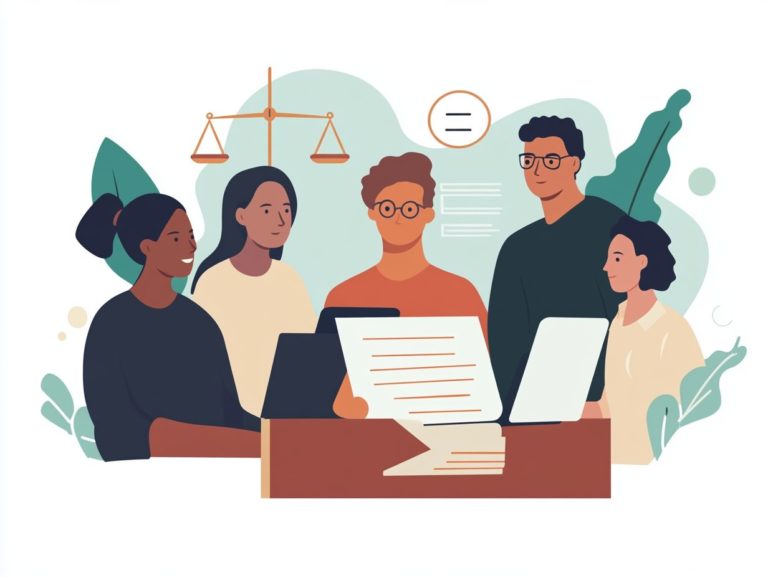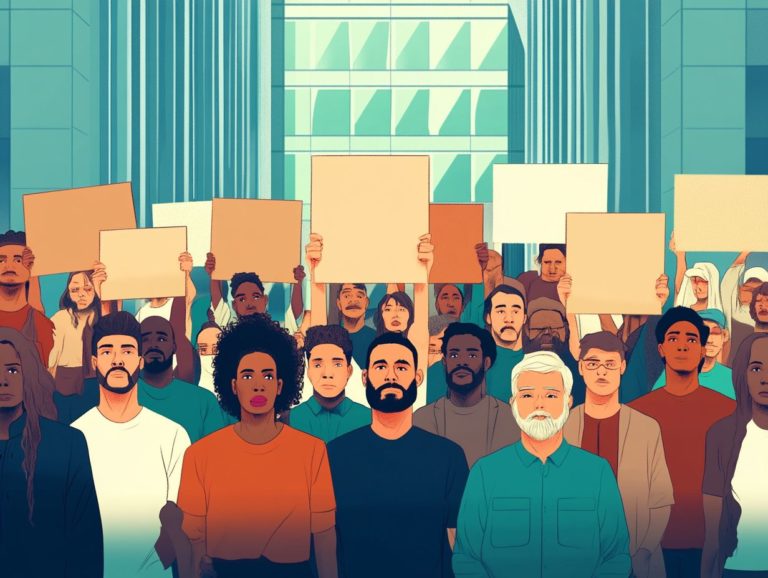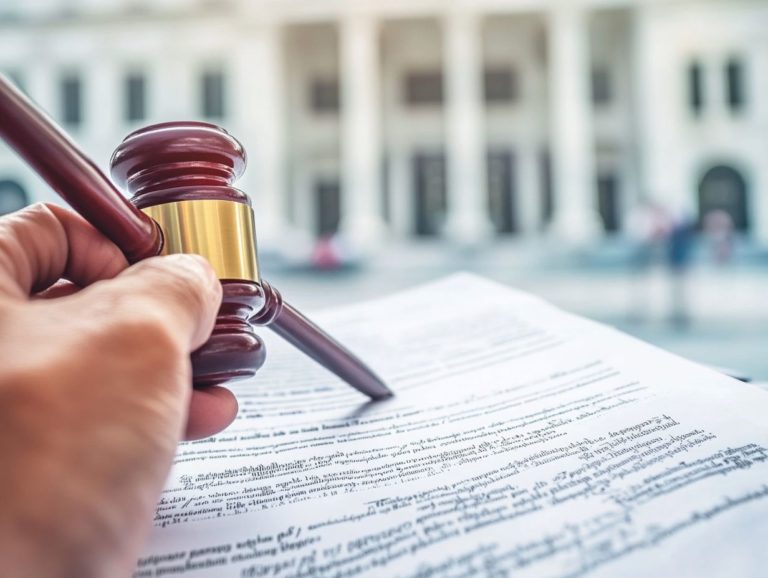Finding Support: Counseling for the Accused
Navigating the complexities of being accused can feel like a daunting journey, filled with anxiety and uncertainty.
Counseling serves as a vital lifeline in this tumultuous experience, offering you emotional support and practical coping strategies tailored to your unique needs.
This article delves into the various types of counseling available everything from individual to group therapy and highlights the profound benefits of seeking assistance.
You’ll also find guidance on choosing the right counselor and what to expect in your sessions, ensuring that you and your loved ones can access the support you need during this challenging time.
Contents
- Key Takeaways:
- The Importance of Counseling for the Accused
- Types of Counseling Available
- Benefits of Counseling for the Accused
- How to Find the Right Counselor
- What to Expect in Counseling Sessions
- Support for the Accused’s Loved Ones
- Frequently Asked Questions
- What is counseling for the accused?
- Who can benefit from counseling for the accused?
- What can I expect from counseling for the accused?
- How do I find a therapist who specializes in counseling for the accused?
- Is counseling for the accused covered by insurance?
- How can counseling for the accused benefit my legal case?
Key Takeaways:

Counseling provides crucial support for the accused, helping them navigate the legal process and access legal support resources for the accused while addressing underlying issues.
Individual and group therapy are available options for counseling, offering personalized and group support for the accused.
When seeking a counselor, consider their qualifications, approach, and compatibility to find the best fit for your needs.
The Importance of Counseling for the Accused
Counseling holds immense significance for individuals who have been falsely accused. It acts as both a support system and a pathway to address the emotional and psychological turmoil that often follows such traumatic experiences, highlighting the role of legal counsel for the accused.
If you find yourself facing false allegations, you may encounter symptoms of PTSD (Post-Traumatic Stress Disorder), such as hyperarousal and emotional numbness. These symptoms can profoundly affect your mental health and personal growth.
By engaging in counseling, you can equip yourself with essential coping strategies to manage your emotional distress. This support can help you heal and rebuild trust in yourself and others.
Understanding the Role of Counseling
Counseling serves a multifaceted role in assisting those accused of false allegations. It offers you a safe haven for emotional expression and therapeutic guidance.
The therapeutic relationship can profoundly support you as you navigate the complex emotions often associated with PTSD, including heightened anxiety and persistent feelings of depression.
By nurturing your emotional intelligence, therapists empower you to gain a clearer understanding of your thoughts and feelings. This leads to healthier coping mechanisms and greater resilience.
These skilled professionals will guide you through your trauma narratives. They equip you with valuable tools to reprocess negative experiences and alleviate the symptoms of PTSD.
Ultimately, with this compassionate support, you can embark on a transformative journey of healing. Discover hope and restore balance in your life.
Types of Counseling Available
You have access to a range of counseling options designed to support individuals navigating the challenges that arise from false accusations. Each type is thoughtfully tailored to address specific needs and preferences.
Individual Therapy
Individual therapy presents a uniquely personalized approach. It allows you to delve into your feelings and thoughts within a confidential space alongside a trained therapist.
This environment cultivates a sense of safety. It enables you to unpack complex emotions and experiences that might be challenging to express elsewhere.
With tailored therapeutic techniques, you can process your feelings. This can enhance your emotional regulation and resilience.
Therapy can be pivotal in rebuilding your self-esteem. You start to recognize your intrinsic worth and develop healthier coping mechanisms.
If you re navigating the emotional distress associated with PTSD, individual therapy can equip you with essential tools to manage triggers and responses. This ultimately empowers you to reclaim your life and nurture a greater sense of well-being.
Don’t wait to seek help! Reach out for counseling today and reclaim your life!
Group Therapy

Group therapy offers you a unique opportunity to connect with others who have traversed similar paths, cultivating a sense of community and collective healing.
In this shared environment, feelings of isolation diminish, paving the way for open dialogues about the daily challenges you face. You ll find solace in realizing that you re not alone in your struggles, which can significantly enhance the emotional support you receive.
By exchanging coping strategies and personal insights, you can discover new techniques for managing Post-Traumatic Stress Disorder (PTSD) symptoms, whether it s through grounding exercises or mindfulness practices.
But it s not just about sharing experiences; this collaborative approach often reveals underlying issues, allowing you to address them in a safe space. Ultimately, this process fosters lasting personal growth and resilience, giving you the power to navigate your journey with newfound strength.
Benefits of Counseling for the Accused
The benefits of counseling for individuals facing false allegations are abundant, offering vital emotional support and practical coping strategies to help them navigate these challenging circumstances.
Engaging in this process can be a transformative experience, equipping you with the tools to manage stress and regain a sense of control in your life.
Emotional Support and Coping Strategies
Emotional support serves as a cornerstone of counseling, equipping you with effective coping strategies to address the distress stemming from false accusations.
As you navigate this tumultuous terrain, therapists become essential allies, offering guidance that nurtures your emotional intelligence and resilience.
By creating a safe space, counselors allow you to explore your feelings, helping you unravel complex emotions and gain a deeper understanding of your reactions.
This journey often involves establishing practical coping mechanisms that give you the power to confront challenges with confidence.
A supportive community is vital for your well-being; connecting with others who share similar experiences strengthens your emotional health, changing feelings of isolation into a rich network of shared understanding and solace.
Addressing Underlying Issues
Counseling serves as a crucial avenue for addressing the underlying issues that may stem from traumatic experiences, including PTSD and emotional distress.
Through structured conversations and therapeutic techniques, you can delve into your thoughts and feelings, revealing deep-seated fears or anxieties. This exploration encourages you to articulate your experiences, leading to greater clarity and promoting healing.
Counseling helps you grow personally by equipping you with coping strategies and resilience tools, all within a safe and supportive environment. Such an atmosphere is vital for rebuilding trust, enhancing self-esteem, and fostering healthier relationships.
Ultimately, this process gives you the power to move forward with confidence and a renewed sense of self.
How to Find the Right Counselor
Identifying the right counselor is essential for anyone navigating the aftermath of false accusations. The quality of the therapeutic relationship plays a pivotal role in your healing journey, influencing how effectively you can process your experiences and move forward.
Factors to Consider

When searching for a counselor, there are several important factors for you to consider, including their expertise in PTSD and the specific type of therapy they offer, whether that s individual or group sessions.
Beyond these primary considerations, it s vital to assess the counselor s qualifications and credentials, as these aspects can significantly impact the effectiveness of your treatment. Specializations such as trauma-focused cognitive behavioral therapy or EMDR can be particularly advantageous for individuals navigating the challenges of post-traumatic stress.
The personal rapport you establish with your counselor is essential in creating a trusting environment that fosters open communication and vulnerability. You should feel at ease discussing your experiences, as a solid therapeutic alliance can greatly enhance your healing journey.
What to Expect in Counseling Sessions
Counseling sessions offer a carefully crafted environment where you can anticipate engaging in a range of techniques and approaches specifically designed to meet your emotional needs.
Common Techniques and Approaches
Common techniques utilized in counseling, such as Cognitive Behavioral Therapy (CBT), which helps change negative thinking patterns, and Dialectical Behavior Therapy (DBT), which focuses on helping people manage their emotions, serve as powerful tools for emotional processing and cognitive restructuring.
These methods are especially effective for tackling PTSD symptoms, providing you with a safe space to confront and process traumatic memories.
During sessions, practitioners guide you in identifying negative thought patterns. This is a vital step in alleviating emotional distress.
DBT introduces mindfulness techniques. These techniques help you stay present and manage your emotions better.
This integration fosters resilience and promotes personal growth, giving you the power to cultivate healthier coping strategies.
As you face your challenges, these therapeutic approaches also encourage you to understand yourself better, paving the way for a truly transformative healing experience.
Support for the Accused’s Loved Ones
Providing support for the loved ones of those facing false allegations is just as crucial. They often endure significant emotional strain and uncertainty during these trying times. Recognizing their struggles can truly change lives.
Resources and Support Groups
Resources and support groups provide invaluable assistance for those seeking to understand and cope with the emotional turmoil that can arise from false accusations. These gatherings create a safe haven where you can share your experiences, cultivating a sense of belonging that is essential for healing.
In moments of emotional distress, the strength of the community shines through as members exchange effective coping strategies, offering insights that can pave the way for personal growth and resilience.
You ll often find solace in the shared stories of others, discovering that you are not alone in your struggles. This collective support normalizes feelings of anxiety and confusion, giving you the power to navigate your complex emotions with increased confidence and clarity.
Frequently Asked Questions

What is counseling for the accused?
Counseling for the accused is a form of therapy designed specifically for individuals who are facing criminal charges or are going through the legal system. It aims to provide support, guidance, and coping strategies to help the accused navigate their legal situation and improve their overall well-being.
Who can benefit from counseling for the accused?
Anyone who is facing criminal charges or is going through the legal system can benefit from counseling for the accused. This includes individuals who have been arrested, are on trial, or have been convicted of a crime. It can also be helpful for family members and loved ones of the accused.
What can I expect from counseling for the accused?
You can expect a safe and confidential space to discuss your feelings, concerns, and experiences related to your legal situation. A trained therapist will work with you to identify and address any underlying issues that may have contributed to your current circumstance.
They will also provide support and guidance to help you cope with the stress and emotions associated with the legal process.
How do I find a therapist who specializes in counseling for the accused?
You can start by asking for referrals from your lawyer, court-appointed counselor, or other legal professionals. You can also search for therapists in your area who have experience working with individuals facing criminal charges.
It’s important to choose a therapist who is compassionate, nonjudgmental, and has the necessary credentials to provide counseling for the accused.
Is counseling for the accused covered by insurance?
It depends on your insurance plan. Some plans may cover the cost of counseling for the accused, while others may not. It’s best to check with your insurance provider to see what services are covered.
If you’re unable to afford therapy, there may be low-cost or free options available through community mental health centers or victim services organizations.
How can counseling for the accused benefit my legal case?
Counseling for the accused offers several advantages for your legal case. By addressing personal problems, you can better understand your actions and make positive changes.
Counseling provides a supportive space to cope with the stress and emotions of legal issues. This can greatly enhance your overall well-being and help you take charge of your future!






